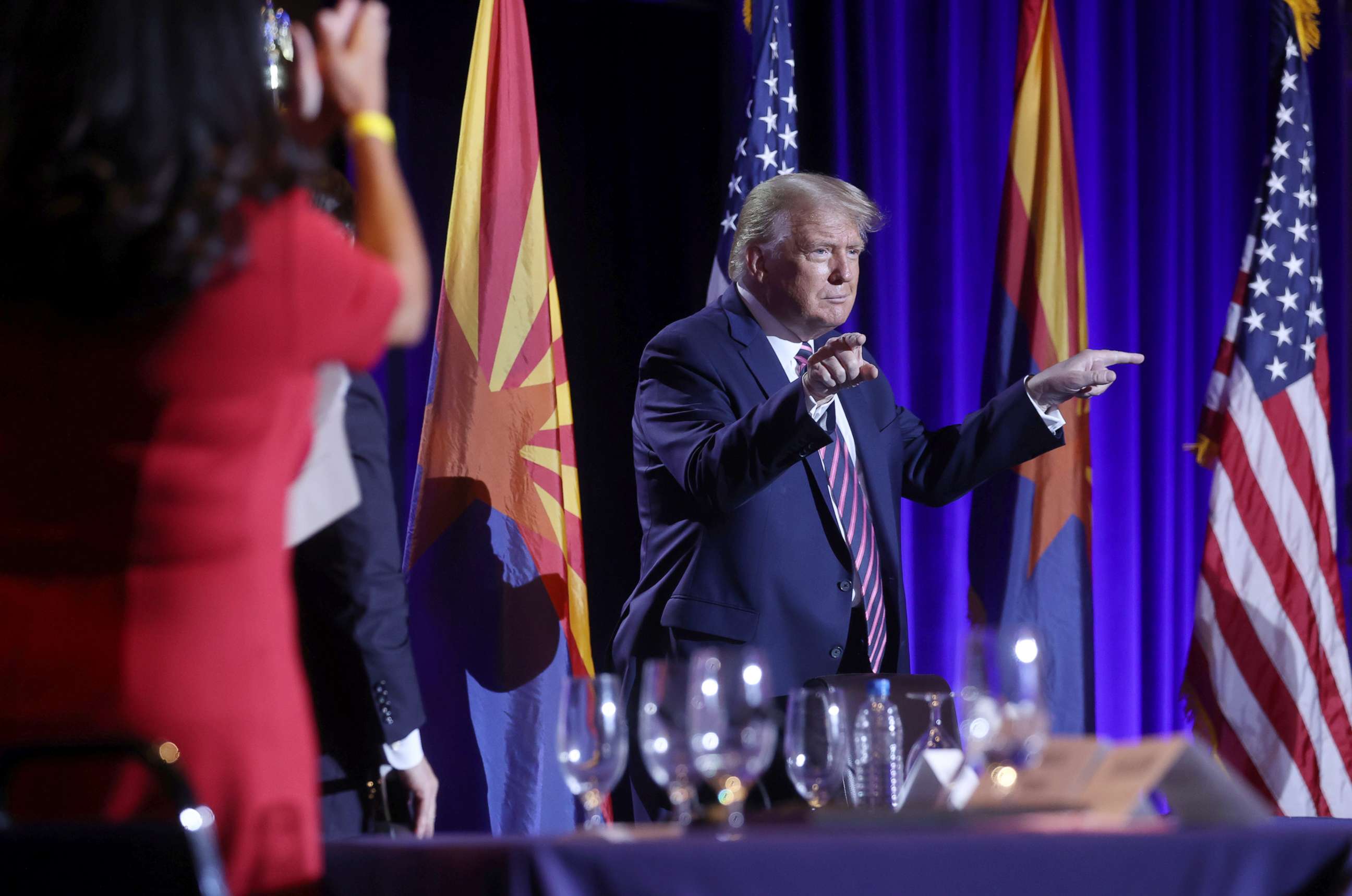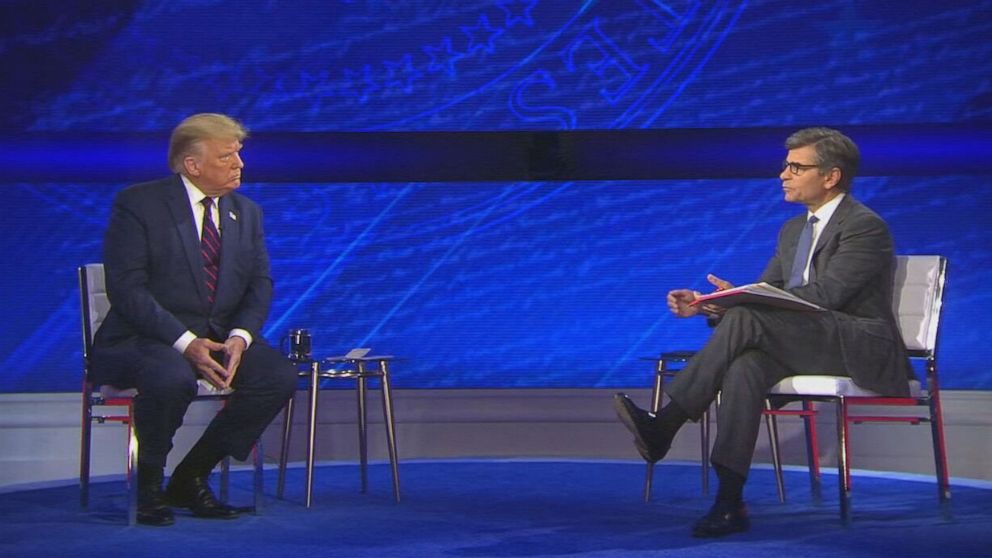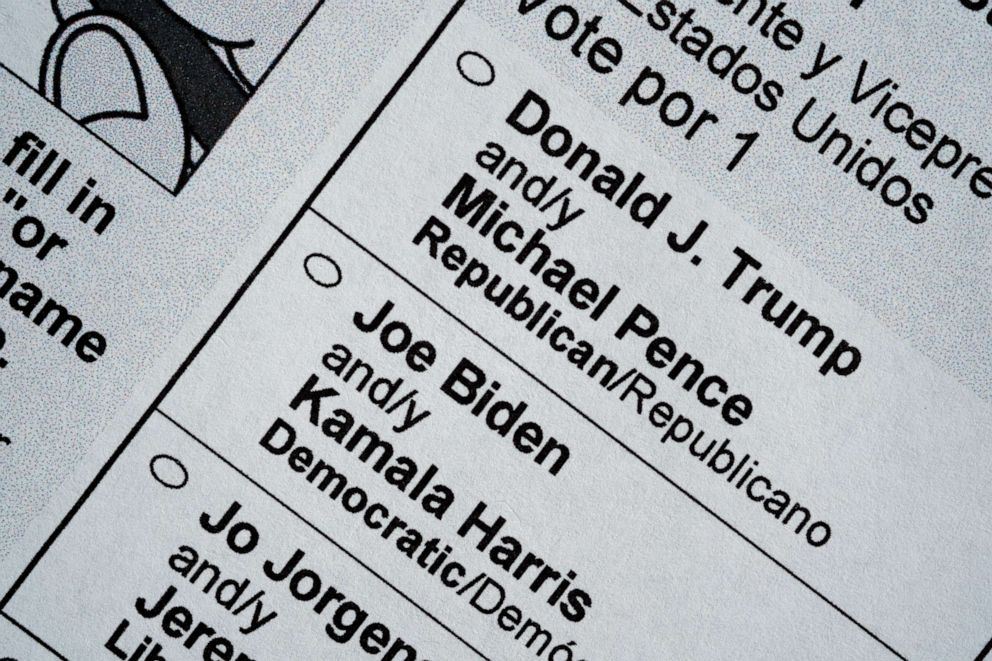The Note: Sun-belt strength shows path for Trump based on economy
Trump has an edge with the economy, but Biden has an edge with COVID-19 handling
The TAKE with Rick Klein
An election about COVID-19 is not the same as an election about the economy -- and both campaigns know it.
New ABC News/Washington Post polling out of Florida and Arizona suggests a race that's basically a tie in both states. Why they're staying close is a function of core strengths of both President Donald Trump and former Vice President Joe Biden -- as well as some potential weaknesses.
In the new polling out Wednesday morning, Biden is up by a single point among registered voters in both states, but he trails Trump among likely voters by one point in Arizona and four in Florida. The data points to Republicans coming home for Trump, and softness in Biden's support among Latinos in Florida in particular.

Trump has a double-digit edge on trust handling the economy. Biden, meanwhile, edges out the president on handling COVID-19 -- which is less of an urgent concern in Arizona and Florida these days than it is in, say, Wisconsin or Minnesota.
Arizona and Florida were not necessarily thought to be in serious play this year. Tied races there, as in Georgia and Iowa -- two other states where recent polling shows a deadlock -- are signs that Trump is playing far more defense than he wants to.
But even while the nation surpasses 200,000 coronavirus deaths, Trump's advantage on the economy remains real. Two very different kinds of races could have very different results -- starting with the president holding his base.
The RUNDOWN with MaryAlice Parks
Despite missing several self-imposed deadlines, the Trump administration continues to claim that it will deliver on a promise more than five years in the making: passing health care reform.
But the fact remains that as of late, the only concrete steps the administration has taken have been aimed at dismantling the current health care system that provides health insurance to millions of Americans.
The latest court challenge to strike away the entirety of the Affordable Care Act will land at the Supreme Court a week after Election Day and has added to the anxiety and anticipation from both sides about the new vacancy on the court.
The ACA currently offers Medicaid to millions of low-income Americans, allows young adults to stay on their parents insurance and provides protections to people with pre-existing conditions.

Tuesday, the White House press secretary insisted that though the president wants to abolish the ACA, he has his own plan, which he will be revealing more within the next two weeks. Vice President Mike Pence also teased possible executive action soon.
Over a year ago though, the president himself promised to ABC News Chief Anchor George Stephanopoulos that he would be rolling out a "phenomenal" health care plan in just two months, which never happened. And proposing a plan is obviously very different than passing one into law.
The TIP with Kendall Karson
In an uncertain election, one reality is becoming all the more certain: a winner on election night is a thing of the pre-pandemic past.
In the last week, legal rulings in the three core battlegrounds of the Midwest -- Michigan, Pennsylvania and Wisconsin -- reinforced that scenario, with judges in all three extending the deadline for accepting ballots after Nov. 3.

In Michigan, absentee ballots postmarked by Nov. 2, the day before the election, and arrive in the mail before the state's election results are certified on Nov. 17 will be accepted. Pennsylvania voters have until 5 p.m. on the Friday after Election Day to return their ballots. And in Wisconsin, ballots that are postmarked by Election Day and received by Nov. 9 will be counted. All three are reversals from previous elections.
Republicans are expected to appeal the recent rulings, potentially to the Supreme Court in at least Pennsylvania. But in states that tilted the 2016 election in Trump's favor by margins smaller than 1%, the possibility of thousands more ballots being counted injects more ambiguity into the election outcome.
THE PLAYLIST
ABC News' "Start Here" podcast. Wednesday morning's episode features ABC News contributor Matthew Dowd, who explains how Senate Majority Leader Mitch McConnell was able to so quickly garner support on hearings for President Donald Trump's next Supreme Court nominee. ABC News' Stephanie Wash joins us from Louisville, Kentucky, where authorities are bracing for protests ahead of an announcement in the Breonna Taylor case. And, we talk with Allegheny County, Pennsylvania, Council Member Bethany Hallam about the announcement that "naked" mail-in ballots won't be counted in the state's November election http://apple.co/2HPocUL
ABC News' "Powerhouse Politics" podcast. Sen. Dick Durban, D-Ill., joins the Powerhouse Politics podcast to talk with ABC News' Chief White House Correspondent Jonathan Karl and Political Director Rick Klein. https://abcaudio.com/podcasts/powerhouse-politics/
"Your Voice Your Vote: The Breakdown" ABC News Live will add a new afternoon political program, "Your Voice Your Vote: The Breakdown," to its schedule. Anchored by "ABC News Live Update" Anchor Diane Macedo and ABC News Senior National Correspondent Terry Moran, the new 30-minute original program will unpack issues important to voters to help viewers make an educated decision about where they stand on an issue. The show will air weekdays, beginning on Monday, at 3 p.m. ET/noon PT.
WHAT YOU NEED TO KNOW TODAY
- Cindy McCain appears on ABC's "Good Morning America" following her endorsement of former Vice President Joe Biden.
- Democratic Arizona Senate candidate and former NASA astronaut Mark Kelly appears on ABC's "The View."
- The late-Justice Ruth Bader Ginsburg will lie in repose at the Supreme Court. Her casket will arrive in front of the court just before 9:30 a.m., to be followed by a private ceremony in the Great Hall. Ginsburg will lie in repose under the portico at the top of the front steps of the Supreme Court building to allow for public viewing outdoors from approximately 11 a.m. until 10 p.m. on Wednesday and from 9 a.m. until 10 p.m. on Thursday.
- The Senate Committee on Health, Education, Labor & Pensions is holding a full committee hearing at 10 a.m. and witnesses include Dr. Anthony Fauci, director of the National Institute of Allergy and Infectious Diseases, Dr. Robert Redfield, director of the Centers for Disease Control and Prevention, Adm. Brett Giroir, assistant secretary for health at Health and Human Services, and Dr. Stephen Hahn, the Food and Drug Administration commissioner.
- The House Select Subcommittee on the Coronavirus Crisis will hold a hybrid hearing with Federal Reserve Chair Jerome H. Powell on the Federal Reserve’s response to the coronavirus pandemic at 10 a.m.
- The Senate Homeland Security and Government Affairs holds a hearing at 10 a.m. on Chad Wolf's nomination to be secretary of the Department of Homeland Security.
- President Donald Trump delivers remarks in honor of Bay of Pigs veterans at 11 a.m. and participates in a discussion with state attorneys general on protecting consumers from social media abuses.
- Jill Biden will join a virtual Arizona student veterans roundtable at 12:30 p.m. MT. At 4:15 p.m. CT she will virtually travel to western Wisconsin to participate in a conversation with Congressman Ron Kind on the impact of the pandemic on women there.
- Democratic presidential nominee Joe Biden travels to Charlotte, North Carolina. In the afternoon, he attends a Biden for President Black economic summit.
Download the ABC News app and select "The Note" as an item of interest to receive the day's sharpest political analysis.
The Note is a daily ABC News feature that highlights the key political moments of the day ahead. Please check back tomorrow for the latest.




